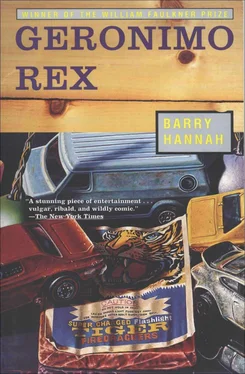Or I could’ve been a cool slob in other ways.
But I wasn’t. I was drawn out of the house. I drove downtown and saw all the sweaty Jaycees in the streets. The way I see it, people in the subdivisions of Dream of Pines started noticing the pine trees were beginning to grow up a little bit in their yards from that devastation twenty years ago when the Sink boys hit town and went into the lumber business — the Sinks had everything but the stumps razed in five years, then they turned on the stumps them-selves and made a fortune making them into paper when the war broke out, but of course pine cones fell off every’ where and accidentally there was quite a new little forest coming up in the subdivisions now — and these people in the subdivisions became very self-conscious about there being Beauty, after all, within the city limits of Dream of Pines. All of the younger men, some of them even Yankees and Midwesterners, turned into Junior Chamber of Commerce personnel. The entire basketball squad graduating from Dream of Pines joined the Junior Chamber of Commerce. They met, and did all that parliamentary procedure hockey. Garbage cans looking like green stubby policemen began appearing on the streets and on what the new signs called avenues . A monthly Yard Award was called into being by the Jaycees.
A bunch of beery good old guys went out and hacked away the vines and trash from a monument. It was a monstrous boulder with a tiny, almost unreadable brass plaque up front. Three soldier’s names. Lost in World War I. Back in that heap of blackberry bushes and ancient rotting pine needles behind the high school. With the cool snakes, the slug slime, cobwebs, and the rock moss and ferns hugging it close. The Jaycees found it. Earl, Bob, and I always knew it was back in there; we hadn’t read the plaque and didn’t want to. We knew it was to the Dead, back in there; somebody’s Dead. It was … gloomy, gorgeous, and deep: oozy, even. With the Dead dignified with the spookiness they deserve. With the spiders and scaly, repugnant creatures, back in the mossy shadows and sordid growth, touching it, wrapping around it adoringly. “Its ours, ours,” they hiss. Not everybody knew it was there. It was in the bottom of an odd scoop — as if real bodies were in the ground in front of the monument — which appeared in the old thicket that scratched us as we passed on the sidewalk from the gym to the classrooms. Earl saw it first one morning about ten. I stared a long time before I picked it out. “God damn. It’s a tomb,” Bob said. I saw the boulder go on back in the shadows, and I knew it wasn’t a tomb; I could see the chisel chips all over it — a scaly living thing, itself. “We won’t tell anybody about it.” “You know everybody’s seen it” “Nobody’s ever said anything about it.” “Why’s it next to the high school?” “It crawled up here.” “Monroe, you dopey fucker.” I can tell you that I didn’t walk that walk alone at night, even when I was eighteen.
One night I couldn’t get to sleep thinking about it. I thought of how nice it would be to disappear — Lost! — into World War I and then come back underground to lie under the noses of the high school students, back there in that serpent gloom. To get out of Dream of Pines, and yet to haunt it! This was the best idea I’d ever been given.
The Jaycees found it, peeled off the moss, killed the snakes, poisoned the thicket, and the monument lay at the bottom of the hill now like a big bone in the sun. I read only the first name on the plaque — something Smith. I was sitting on the stone at noon and the sun was like a fluorescent lamp leaning against me. The temperature was a hundred degrees. I tried to feel something. God of the shade and sleeper that I am, I did open my eyes wide as I could and try to feel something here on the stone of the three lost men. I got a hot profound nausea and a headache.
The Jaycees put triangles of shrubs or flowers around some new green brass historical markers. I was all for it. Wanted to pick up on this new history of my place. One of the new plaques was set on the median of a hot intersection; tin cars were flying everywhere and reflecting sprays of plastic colors like crazy. Ten thousand folks lived in Dream of Pines now; taxes in the parish were low, and three factories had set up in one year. This plaque was on the north side of town; perhaps I’m the only guy who’s read it. It remarks on the fact that just thirty miles south of here used to be this fellow of the late 1700’s, this Frenchman, Pisroin, whose accomplishment was … with all his heart … against a wild jungle … being French. Being French . That’s it. Damn, if I could make out anything else. That’s all they could dig up for Dream of Pines.
Well, still I was drawn around town, down to the old center of commerce, with the old one-story red brick shops from 1915, neither ugly nor beautiful, as I saw it, and the red brick streets, the same, all fading now with a brownish grime that I always took to be rather charming — easy on the eye, all the angles rounding, bending. Ladders were standing thick in the street. Negroes were ganged around watching. The shopowners were putting up striped aluminum awnings and fiberglass false fronts, at three in the afternoon, in front of everybody. Bricks were falling onto the raised sidewalk and crashing down into the gutter, where I was. Some workmen inside were getting rid of these bricks with a machine that went off like a shotgun. I jumped out of the way of a few powdery brick fragments from 1915. Finally I understood what was going on. The merchants were having the brick blown out of their front walls to make room for show windows. A week later they had them, and the drugstore on the corner where I charged cigarettes under the name of milk shakes let out a huge banner photograph of a Revlon model in its show window.
This Revlon model picture stung me in the guts. She was a skinny thing lying supine in a silk outfit, with a high-heel shoe dangling off her toe. Her face was big and just this side of weird, in her silvery Revlon eye and mouth makeup. She was lying on a pillow of sand and behind her, in twilight, was the whole Sahara desert. The top of one breast stretched above the neck of her gown; one thigh lifted under the dress, so you saw she wasn’t all that skinny. She was playing with a piece of her own black hair. I had to have her. What kind of cruelty was this to have her photograph lying there? What did I have to do to get her? Her eyes looked as if they bragged on all she’d seen and understood. I would understand, I would learn all of Culture, if that’s what it took. Tears came out of my eyes. I would go to college and study Culture.
God damn Madison Avenue … New York! Why do you have to make every woman you work on into an idol ? Why does she have to be silver? Why does she have to be lying out on the Sahara desert like only the smoothest Arab who knew everything in the world could possibly deserve her? You made me marry her, that luminous teenager down at Pascagoula, Mississippi. That pubescent Arab-looking girl, Prissy Lombardo, the girl who had kissed everybody! She was an underdone fascimile of the gal in the Revlon photograph. I admit it heartily. The sand, the silvery shoe draping off her foot, the eyes as wide and cognizant as animated black pearls. I had this scene with her; asked her to marry me. Prissy didn’t have quite the body of the Revlon gal. The beach was white and rippled, but not the Sahara. It was the beach of Biloxi, Mississippi. However, this beach, stretching from Pass Christian to Biloxi, was then the longest manmade beach in the world. It may be still, for all I know. Doesn’t take away any of my anger.
One last time I drove into Dream of Pines to see how the aqua fiberglass fence around the mills was doing out in all this sun. I drove over the tracks and noticed that Ann Mick’s house had disappeared. The old shack wasn’t with us any more; there was only that hideously pounded-out earth where it used to be; a few dozer swaths, crushed wine bottles, dirty newspapers, flattened and yellow. I haven’t seen Ann or any of the Micks since then. Don’t know if they went to another city or straight to hell. Mr. Mick didn’t show up at work, and poof! The Micks were our only outright slum. My heart was out there in that hot field. I remembered my dream of Ann, of our love, of Malibu; I was still under the spell of it. I was a little ashamed of it, but it still had me; I always trusted my dreams before anything else. And now the vacant field, with the terrible noon sun above it and this plastic sweat on the steering wheel dripping on my hands, was bringing me awake, miserably, horribly, like somebody waking you up by pouring warm molasses on your eyes. Hell, I didn’t want Ann any more. I knew I could do better. But the familiarity of her in that hypnotic dream … The aqua fiberglass fence was running through the middle of their former shack. Through the middle of my dreamy heart. I could’ve coughed up a portion of that fence right out of my chest at the time.
Читать дальше












